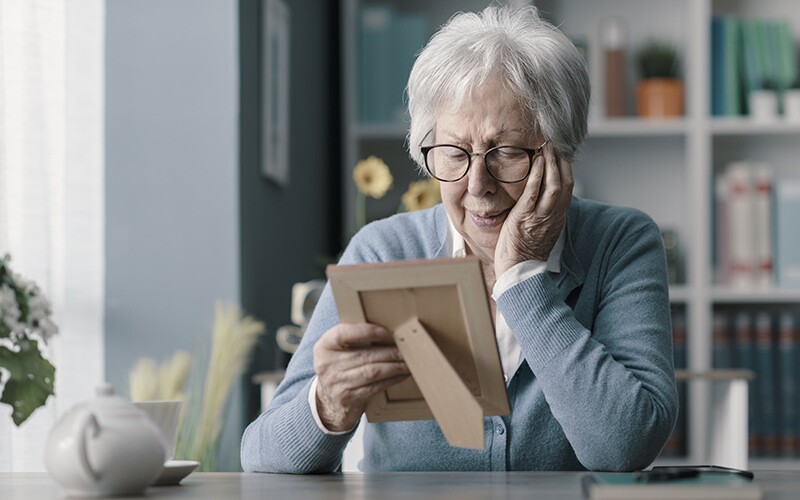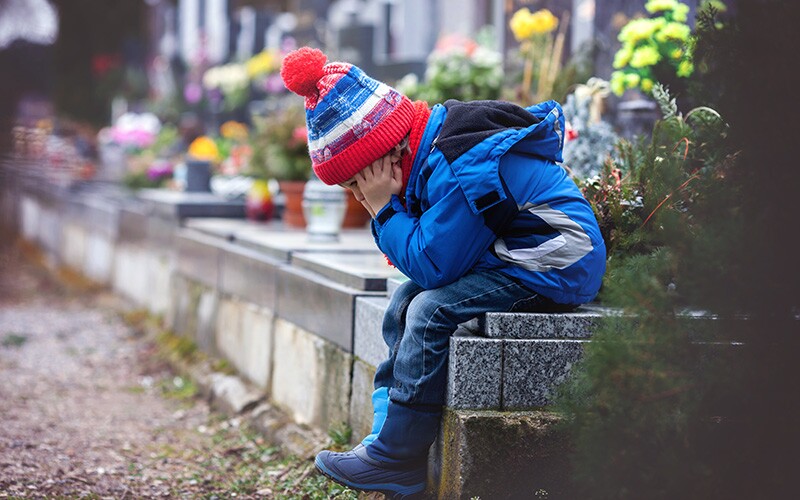The grief we experience at the loss of a loved one can be overwhelming. Perhaps you’ve felt this deep sorrow in your own life or witnessed it in the life of a family member or friend. You know how discouraging and even devastating it can be.
Can anything be done to help ourselves or the people we love through the grieving process? Every situation is different, of course, but experts say understanding a few basic principles can help and that finding ways to preserve and share your loved one’s memory with others can be a powerful source of comfort.
Grief Is One of the Most Fundamental of All Human Experiences
Nearly a thousand years ago, the Italian philosopher Thomas Aquinas wrote:
As anyone who has experienced significant grief can attest, waves of sorrow can roll in without a moment’s notice, brought on by the simplest of stimuli, from the sight of a woman who looks like a beloved spouse now deceased, the sound of a voice like that of a long-dead brother, or a smile like that of a much-missed child. Even the scent of a loved one’s favorite meal cooking or a whiff of special perfume or cologne can “set off” intense feelings of longing, the grief of missing a deceased loved one.1

As old as Aquinas’s words are, they read as if they could have been written yesterday, evidence of how universal and fundamental grief is to the experience of nearly all humans. Grief is our natural response to loss.
The word natural is important here. From person to person, our responses to grief will be different, sometimes drastically so. But that doesn’t mean that one response is inherently better or more appropriate than another. Our own response depends in large part on our personality and coping methods. Sometimes these methods are deliberate, conscious choices that we reflect and meditate on, and sometimes they aren’t. They’re just how our body and mind react, and that’s okay.
Being Patient with Ourselves—and Others
Steven Eastmond, a licensed therapist, writes that “grief may include hopelessness, anxiety, anger, denial, guilt, incapacitating fatigue, difficulty in controlling emotions, lack of concentration, loss of interest in people or activities, and feelings of being overwhelmed.” These are painful emotions, and we may be tempted to ignore or hide them from others. Eastmond says this can actually make the grief worse and prevent us from ever feeling better. “Grieving is not a brief process,” he says. “Be patient with it and give it time. As with a physical wound, the pain of losing a loved one requires time to heal.”2

We can also be more patient in our interactions with friends or family members who may be grieving. Perhaps we struggle with knowing what to say. In Lament for a Son, author Nicholas Wolterstorff gives this advice:
Some people are gifted with words of wisdom. For such, one is profoundly grateful. … But not all are gifted that way. … Your words don’t have to be wise. The heart that speaks is heard more than the words spoken. And if you can’t think of anything at all to say, just say, “I can’t think of anything to say. But I want you to know that we are with you in your grief.”3
Sometimes just being there is the best and only thing a person can do to support a loved one who is grieving. As the author Roger Rosenblatt has said, “What is the difference between grieving and mourning? Mourning has company.”4
For Those Grieving Right Now
Experts say there are many things people can do to cope with grief. An article on grief at Cancer.Net stresses the importance of physical activity and maintaining a routine in order to “keep you connected to familiar people and places.” It also encourages forgiveness: “Forgive yourself for the things you regret doing or saying to your loved one. Also forgive yourself for the things you regret not doing or saying.”5

Due to COVID-19, the Centers for Disease Control and Prevention currently provide several detailed recommendations to help people cope with grief, such as creating and saving memories of the loved one and inviting family and friends to do the same.
The website also suggests taking part “in an activity, such as planting a tree or preparing a favorite meal, that has significance to you and the loved one who died.” Finding ways to honor the person you miss can bring a measure of peace and lift some of the pain that you feel.6
Honoring Your Loved One through Family History
If you’re grieving for a friend or family member, consider uploading a memory to FamilySearch or another family history site as a way of honoring him or her. On FamilySearch, others can see the memories you upload, and you can save photos, typed stories, scanned documents, and even voice recordings. In each case, the process is the same. Once the memory is uploaded, be sure to label it with a tag. A tag identifies the person in the memory and attaches it to his or her page on FamilySearch. This makes the memory easier to find. You can also use the Memories share option, on either the website or the app, to share the memory through social media or email.
Learn more about adding memories here, or get started by creating a free FamilySearch account.

Finding Strength to Endure
Grief can be an agonizing experience, and you may need to talk with a licensed professional to identify your next step forward. “Grief counseling” and “bereavement counseling” are both good search terms to use if you’re looking for help on the internet. You can also try a crisis phone number, such as Befrienders Worldwide or Crisis Text Line.
As you grieve, remember to take care of yourself. Your body needs sleep and exercise. Your mind needs companionship. Stay connected with friends and family, and keep up on your hobbies. You might feel like the painful emotions will never go away, but research, history, and the experiences of millions of people before you can give you hope that even the deepest wounds will eventually heal and that the memories of your loved one can become a source of profound joy.
2 Steven Eastmond, "The Healing Power of Grief," Ensign, Jan. 2014, 63, 64.
3 Quoted in Dalton-Bradford, On Loss and Living Onward, 76.
4 Quoted in Dalton Bradford, On Loss and Living Onward, 73.
5 “Coping with Grief,” American Society of Clinical Oncology, Mar. 2018, Cancer.Net. [full URL for hyperlink: https://www.cancer.net/coping-with-cancer/managing-emotions/grief-and-loss/coping-with-grief]
6 "Grief and Loss,” Centers for Disease Control and Prevention, cdc.gov. [full URL for hyperlink: https://www.cdc.gov/coronavirus/2019-ncov/daily-life-coping/stress-coping/grief-loss.html]

